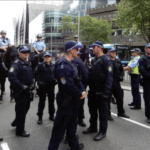18C is here to Stay

Tony Abbott recently announced that the proposed repeal of 18C will no longer be going ahead. His plan had met with community backlash, with protesters hitting the streets to show their opposition.
This provision of the Racial Discrimination Act makes it unlawful to act in a way that is reasonably likely, in the circumstances, to offend, insult, humiliate or intimidate another person or a group of people, if it is done because of the race, colour, national or ethnic origin of the person.
There is one important stipulation: this provision only applies in public.
Such behaviour made in private do not come under this provision.
‘Public’ in the Act includes any sounds, words, images or writing that is communicated to the public as well as behaviour that is done in a public place or in the sight or hearing of a public place.
The new act would have replaced ‘offend, insult, humiliate or intimidate’ with ‘vilify’ – a much stronger term which will be defined as inciting racial hatred.
Some criticism from the legislation was against the use of the words ‘offend’ or ‘insult’, due to the inherently subjective nature of the words.
What offends or insults one person may be acceptable to another person.
In addition, it has been argued that having your feelings hurt by someone else’s opinion is not severe enough to warrant legal protection, and the erosion of someone’s freedom of speech.
It is has been said that the back down is partly due to the government wanting to avoid creating a greater distance between itself and racial minorities given the proposed new anti-terrorism laws.
It is hoped that leaving the existing law in place will mean that more people are on board for “Team Australia” – perhaps a coded way of saying that dumping the changes may help mollify those who are likely to take offence to increased terrorism legislation.
Can I face criminal prosecution under section 18C?
No.
While the behaviour outlined in 18C is not lawful, it is also not a criminal offence.
However, using offensive language or engaging in offensive conduct are criminal offences under the Summary offences Act.
The maximum penalty for offensive conduct under section 4 of the Act is a fine of $660 and/or three months jail time.
The maximum penalty for offensive language under section 4A is $660 or community service work.
The Summary Offences Act does not specifically mention racism but generally states that a person cannot use offensive language or conduct him or herself in an offensive manner in, near or within view or hearing of a public place or a school.
You may remember the woman who made headlines for her racial tirade on a crowded peak-hour Sydney to Newcastle train.
She was filmed mocking and imitating an Asian woman.
The woman had also been swearing at children who refused to give up their seats for her.
Karen Baile, aged 55, was charged with offensive conduct.
While this did get a lot of media attention, and public condemnation, the woman pleaded guilty in court and walked free.
She left the Downing Centre with no criminal conviction and a 12-month good behaviour bond.
The Presiding Magistrate noted that Bailey showed remorse and had no criminal record and that her comment appeared to be out of character.
Bailey herself said that she had been under a lot of pressure and just snapped – she had been under stress from caring for her father and husband as well as failing to secure a job that she had applied for.
While some agree with the leniency shown to Bailey, as we all ‘snap’ from time to time, others have voiced the opinion that people like Karen Bailey are the reason that the anti-discrimination laws should remain in place.
It was also telling that one of our lawyers saw Bailey ‘snapping’ at a person who was using their mobile phone just outside the courtroom.
Bailey’s case demonstrates that there are laws in place to prevent people from acting in an offensive way in public, including offensive conduct that is racist.






